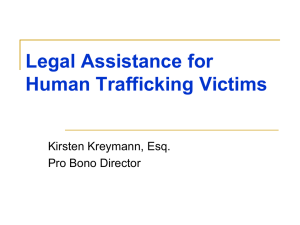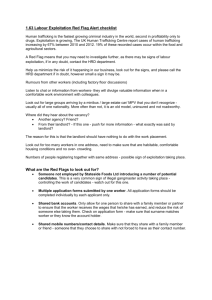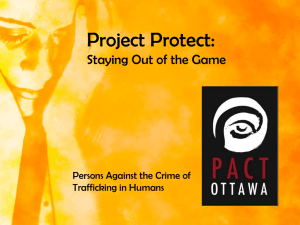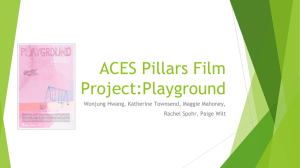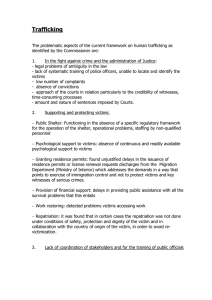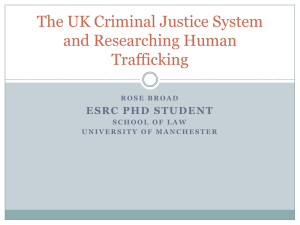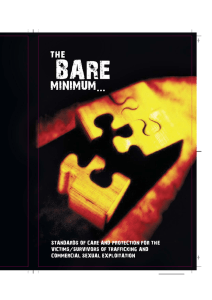investigation in itpa - United Nations Office on Drugs and Crime
advertisement
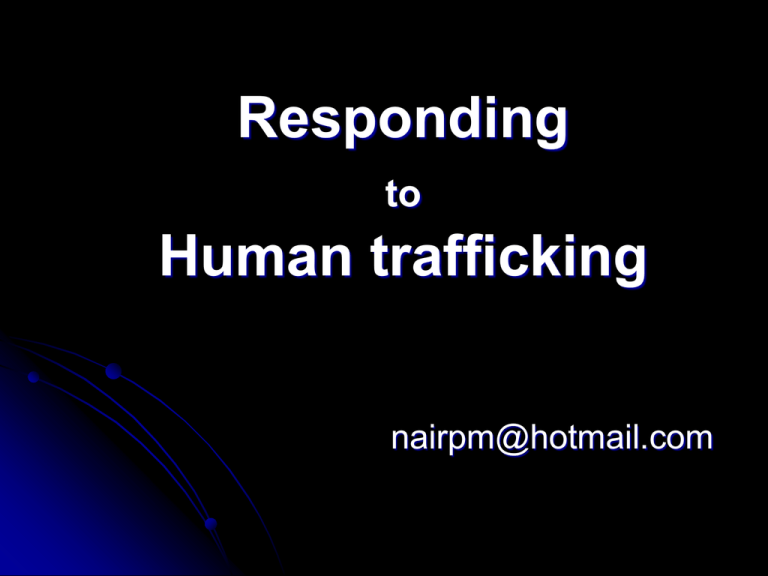
Responding to Human trafficking nairpm@hotmail.com As we proceed Challenges Common doubts. Myths, mind-sets Aberrations, violations Good practices And a roadmap… moving ahead taxonomy Trafficking for •Commercial sexual exploitation •Exploitative labour •Other types of exploitation Article 23 prohibits trafficking for any exploitation 3 Labour trafficking Organized sector-industries, factories Unorganized sector- construction work Entertainment industry- circus, camel racing Domestic labour Others- begging Trafficking for other types of exploitation Organ trade Pornography Trafficking under the façade of marriage Etc… Trafficking for commercial sexual exploitation 6 A GIRL CHILD TRAFFICKED INTO COMMERCIAL SEXUAL EXPTN Let us listen to her…… 1. DISPLACED ( ABDUCTED? ) 2. CRIMINALLY CONFINED 3. CRIMINALLY RESTRAINED FROM THOUGHT / ACTION 4. PHYSICALLY & MENTALLY TORTURED / INJURED 5. SOLD 6. PURCHASED 7. MODESTY OUTRAGED 8. RAPED REPEATEDLY 9 9. VICTIM OF SEXUAL PERVERSIONS 10. SERVITUDE & DEBT BONDAGE 11. PRIVACY DENIED 12. ACCESS TO JUSTICE DENIED - NO REDRESSAL 13. CRIMINAL CONSPIRACY 14. MULTIPLE ABUSE & ABUSERS * ORGANIZED CRIME* *BASKET OF CRIMES* 10 THE HR VIOLATION OF THOSE TRAFFICKED ACROSS THE BORDERS 1. DEPRIVATION OF RIGHT TO LIFE (SLAVE LIKE CONDITIONS) 2. DEPRIVATION OF RIGHT TO SECURITY (PHYSICAL & ECON) 3. DEPRIVATION OF RIGHT PRIVACY (BONDED LAB) TO 11 Contd…. 4. 5. 6. 7. 8. DENIAL OF ACCESS TO HEALTH SERVICES DENIAL OF RIGHT TO SELF DETERMINATION (RESOLD) DENIAL OF RIGHT TO RETURN TO OWN COMMUNITY - “STATELESS” DENIAL OF RIGHT TO REPRESENTATION (STATELESSNESS) DENIAL OF RIGHT TO BE HEARD BEFORE DECISION MAKING trafficking vs prostitution process vs purpose prostitution per se… multiple offences in HT uneven understanding trafficking is not prostitution 13 WHAT CONSTITUTES TRAFFICKING DISPLACED FROM COMMUNITY TRANSPORTATION COERCION / DECEIT EXPLOITATION of vulnerability COMMERCIALIZATION SERVITUDE VIOLATION OF HUMAN RIGHTS ORGANISED CRIME BASKET OF CRIMES the response systems ACTION RESEARCH on TRAFFICKING IN WOMEN CHILDREN & by the NATIONAL HUMAN RIGHTS COMMISSION and UNIFEM, INSTITUTE OF SOCIAL SCIENCES 16 Trafficking in Women and Children in India - Published by Orient Longman - 2005 DATA COLLECTED THRU INTERVIEWS: 2006 SURVIVORS 561 VICTIMS OF CSE 929 CHILD LABOURER 510 BROTHEL OWNER 412 TRAFFICKER 160 POLICE OFFICIAL 852 CLIENTELE 582 18 VOL II: 154 CASE STUDIES: IN 5 SECTIONS TRENDS EXPLOITATIONS VULNERABILITIES RESPONSES - PROACTIVE RESPONSES - REACTIVE 19 FINDINGS in BRIEF 70% trafficked victims are from SOCIALLY DEPRIVED SECTIONS 58% WERE “ARRESTED” EARLIER mostly RELEASED by the BROTHEL OWNER 67% brothel owners were erstwhile VICTIMS of trafficking- VICIOUS CYCLE ? 20 62% REACHED BROTHEL BEFORE 18 yrs and 23% before 16 yrs 32% had serious health isues 85% in a Rescue Home in Hyderabad are HIV + EXTREME EXPLOITN OF GIRL CHILD A girl child of 16 says, “ I had 13 “CUSTOMERS” last night !! First sexual experience for 74% at less than 18 years of age for 46% at <16 alarming level of incest and child abuse !! VULNERABILITY front? at one’s own home 22 TRAFFICKERS VULNERABILITY capitalize on SUPPLY is dictated by DEMAND+ PROFIT+ANONYMITY+POOR LAW ENFT MOSTLY LURED- 44% WITH JOBS, 30% WITH MARRIAGE PROSPECTS Vulnerability factors… 23 ARREST OF PERSONS UNDER ITPA YEAR TOTAL FEMALES MALES 13225 1574 (89.4%) (10.6%) 12088 1762 (88%) (12%) 10263 2560 (80%) (20%) ARRESTED 1999 2000 2001 14799 13870 12823 24 C0NVICTION PATTERN IN ITPA CASES (Source: Crime in India by NCRB, Government of India) 1999 2000 2001 CASES P/T 15423 15815 14000 CONVICTED 8653 9002 7758 ACQUITTED / 636 1614 576 93% 85% 93% DISCHARGED % OF CONVICTED TO TOTAL DISPOSAL WHO ARE THESE 93% CONVICTS ! HOW CONVICTED & HOW FINE IS PAID CHANGING INDICATORS IN many places. 25 72% interviewed victims stated that they had been convicted earlier on charge of “soliciting” Does it meanvictimization of victims? human rights violation? exacerbate the vulnerability? Who are the “customers”? 73 % were living with spouses 32% never used condoms High demand for young children, both boys and girls Are they “customers” or offenders? Why demand for young persons? 34% said “due to fear of AIDS” 53% said “because children were submissive” Exploitation of vulnerability Sex tourism High level of demand- both international and national clients Destinations-not only international tourist destinations, but also local In the name of business promotion In the façade of “massage parlour” etc The extent and depth of the problem stands exposed by Freddy Peats case and other crimes. DECREASING -> AGE OF VICTIMS INCREASING -> DEMAND INCREASING -> LEVEL OF EXPLOITATION TRAFFICKING >>> HIV/ AIDS HIV/ AIDS >>> TRAFFICKING MISSING PERSONS vs. TRAFFICKING CASE STUDIES OF DELHI, MUMBAI, CHENNAI LINKAGES OF TRAFFICKED VS. MISSING PERSONS NATIONAL DATA OF MISSING PERSONS UNIQUENESS OF DATA 31 Annual all - India data of missing persons: Average of 6 years – 1996 to 2001 Category Persons Reported Missing Women 22480 Children 44476 Not Returned 5452 11008 % Not Returned 24.3 24.8 32 Annual data of missing persons in 6 metros Average of 6 years – 1996 to 2001 Category Persons Reported Missing Women 7679 Children 15407 Not Returned 3289 5833 % Not Returned 42.8 37.9 33 More issues in LAW ENFORCEMENT PUBLICITY OF RESCUED GIRLS AND WOMEN VIOLATION OF S.228A IPC ? VIOLATION OF S.21 OF JJA ? How do we ensure accountability? 34 Police response during interview: 60% crimes not reported only 6.6% had any training on trafficking/related issues nil/ low priority issue Problems of post- rescue care Lack of integration with other govt. depts( rehab/post-care etc). Lack of network with NGOs 35 Interviewed Police officials stated: Traffickers are seldom arrested Clients are seldom arrested at best brothel keepers are booked easily bailed out, mostly by the group of exploiters themselves Age determination- med.exam- a major challenge Lack ofprotocols, directives / supervision 36 Human trafficking: Developmental issue Public health issue HR issue Public order issue Governance issue Anti human trafficking is everybody’s business. Are we part of the solution or of the problem part HOLLISTIC and INTEGRATED functioning is essential PREVENTION P-P-P MODEL PROTECTION PROSECUTION 38 prosecution Registering FIR WHERE to register FIR Do we take up cases at the source area WHO will be the complainant? Is it has to be the victim Can NGO be complainant If the victim doesnot speak to the details in FIR, what to do Associating prosecutors ? Investigating into the offenders WHO ARE THEY ?? SPOTTER,RECRUITER, SELLER, PURCHASER, TRANSPORTER, ABUSER, EXPLOITER, FINANCIER, CUSTODIAN, KEEPER, PIMP,CONTRACTOR, OTHER CONSPIRATORS… Investigating Organized Crimes How to go about p.o.a. and check list Organized crime approach Intelligence sharing – crime to crime, From witness, victim, accused source <-> transit <-> destination Timely sharing – use AHTU, Nodal officers Evidence transfer Database and data management on suspects Network of police and NGOs Presenting the case to the COURT Do we prepare Crime mapDo present the trafficking map How to present evidence of child victimnatural or doctored? Case study- KCJ case Electronic presentation When is investigation complete Provisions of 173 (8) CrPC Till the case reaches its logical conclusion When is that conclusion Mumbai Case study of 10 MISSING GIRLS.ppt Post conviction steps Enhanced punishment Closing down places of exploitation After conviction & during investigation too Who can do it- how to do- impact…. Surveillance Externment Dossier- ITPA and related IPC and other offences EXTERNMENT & SURVELLANCE ANOTHER POWERFUL TOOL IN LAW ENFT DM/SDM HAS POWER TO EXTERN/REMOVAL OF PROSTITUTE FROM ANY PLACE (20) IF A PERSON CONVICTED EARLIER UNDER ITPA OR CONCERNED SEC OF IPC IS CONVICTED AGAIN IN ANY OF THESE LAWS, HE CAN BE KEPT UNDER SURVEILLANCE UPTO 5 YEARS- s.11(1)(b) Illegal assets of the offenders Do we take time to locate the assets The dynamics of illegal acquisition- BRP case study ROLE OF ASSET CONFISCATION in law enforcement- dealing with organized crimeItalian example Can the law help 105C to 105 J CrPC ? Criminal Law Amendt Ordnance 1944 ? Other special laws Intelligence gathering & dissemination Int from interview of victims etc Int from interrogation of suspects Source, transit, demand areas Data base Sharing Organized crime perspective protection Rescue u/s 15 No need of warrant / permission SPO can do Can authorize any SI and abovein writing/orally Enter in GD and proceed Do conduct investigation Rescue victims, arrest offenders, search, seize, record statements etc Rescue u/s 16 ON REPORT FROM POLICE OR OTHERWISE ANY BODY CAN REPORT BY MM / JMI / DM / SDM DIRECT ANY SI OR ABOVE (NEED NOT BE A NOTIFIED SPO) RESCUE OF ANY PERSON WHO IS MADE TO CARRY ON PROSTITUTION IN A BROTHEL (S.16) let us not forget… Rescued persons are human beings with dignity Cannot be kept in the PS like recovered property Therefore … Dos and donts in rescue Segregating victim from accused Carrying belongings Child vs adults Interviewing for age, belongings, locating other victims, accused, documents, ev etc Best care and attention from the victims perspective validation NGOs IN LAW ENFORCEMENT IN THE ADVISORY BODY U/S 13(3B) SEARCH AND INTERVIEW OF WOMEN RESCUEE – WOMEN NGO TO BE ASSOCIATED IF WOMAN POLICE OFFICIAL NOT AVAILABLE [15(6A)] DECISION ON REHABILITATION TO BE TAKEN BY MAGISTRATE IN CONSULTATION WITH A PANEL OF 5, INCLUDING AT LEAST 3 WOMEN SOCIAL WELFARE WORKERS [17(5)] HOME VERIFICATION (CAPABILITY OF GUARDIAN ETC.), BEFORE REHABILITATION, IS TO BE DONE BY THE NGO [17A] INTERVIEWING TECHNIQUES Victim perspective How many times to interview- Peter case Who all will interview Where and when to interview COGNITIVE interviewing Gender perspective Legal requirements 15 (6A) ITPA Child perspective- story of CHOCOLATE UNCLE.ppt How to take care of the VICTIMS ? Zero tolerance to arrest of victims. CHAMPARAN CASE.ppt Respecting & ensuring victim’s rights during and post rescue Validation of harm, psychosocial redressal LISTEN to the victim- in full measure How to record detailed statement of victim Help of counselors/ women NGOs The victim perspecitve : seeing from the best interest of the victim Knowledge + Skills + Attitudinal orientation How best to use the law and court rulings Human Rights oriented application of law Case study- FARIDA CASE ppt AGE ASSESSMENT RELEVANCE WHO CAN DO IT How to get EXPERT advice IF NO EXPERT IS AVAILABLE If the expert report is incomplete, contrary to facts COURT RULINGS ROLE OF CWC Victim care during the court trial Anonymity Briefing Sakshi Judgement Sept 2004- Do ensure compliance Security of victims/ witnesses Legal provisions Video conferencing- Praful Desai case Thanking the victim- not to be forgotten VICTIM REHABHow can police help Advantages of police initiative/involvement Proper care of rescued persons Prevention of re-trafficking Preventing crime- a mandate Integration with other depts Partnership with NGOs Networking with Corporates/ employers Model from orders of DELHI High Court.ppt prevention Action at the Demand area Transit area Source area At the demand area: Demand reduction Stringent prosecution BRP case study Dealing with adolescents Action at the transit areas Interventions Sanauli experiment of SEWA AHTUs Intelligence + action Action at the source area Addressing vulnerability Involving development depts Involving NGOs Involving survivors Police can be catalyst Tracing missing persons Annual all - India data of missing persons: Average of 6 years – 1996 to 2001 Category Persons Not Returned Reported % Not Returned Missing Women 22480 5452 Children 44476 11008 24.3 24.8 67 The AHTU model Started by UNODC in 2006 in the UNODC- MHA Project on AHT, along with State Police, in 5 states The rationale AHTU: Holistic and integrated model PREVENTION PROTECTION PROSECUTION 69 The AHTU model The Process undertaken Needs Analysis in the field- end user perspective, local issues relevant Partner identification: know your teamcore competence + integrity Empowerment, capacity building by sustained, focused, professional trg programme The AHTU model The Process in setting up AHTU also included: Providing resources- protocol, handbooks, vehicle, computer, cells, furniture, contingency funds Providing networking Sharing good practices and experience Non Expendable Items Expendable Items Mobiles Furniture Vehicles Landline Computers Resource Materials The AHTU model The impact of AHTU Synergy by sharing core competence Best interest of victim ensured- no victimization Best outputs on rescue, minor’s rescue, detention of offenders, expeditious investigation, prosecution and trial, conviction, stringent punishment, fining offenders, closing down places of exploitation etc. The impact of AHTU contd… Crime prevention Qualitative improvement in police investigations in other crimes Improved gender rights Improved child rights. Enhanced accountability of responders The impact of AHTU contd… NGO also as ombudsman Intelligence from anonymous callers Public trust enhanced Help seeking & help rendering up New partners in action- Corporates, business houses New initiatives in rehab- sustained livelihood options, out-of-the-box other outputs in the UNODC Project Printed resource materials, Handbook, Protocols, SOPs, Posters, Documentary Film, Training Manual, Model MOU National Database of trained Resource persons and consultants. National network of Govt + NGO 76 MIS model from the CAC of MWCD Integrated MIS- non availability, urgency Model developed by me for the CAC of MWCD Along with NCRB States can adopt and make best use of data monitoring Excellent tool in ensuring best response and holistic management of HT Make the best use of … These Resource materials, Posters, Film, Hand book Network Database MIS And invest in the responders Train, Empower,Facilitate, Reward Best Resource persons, incl willing victims Make responders accountable You can ensure the best in preventing and combating human trafficking Need will and commitment. Resources available The mantra… You may be just one person in the entire world, But you are the entire world to that personthe trafficked victim THANK YOU FOR YOUR KIND ATTENTION nairpm @ hotmail.com Tel: 0-9868115515
